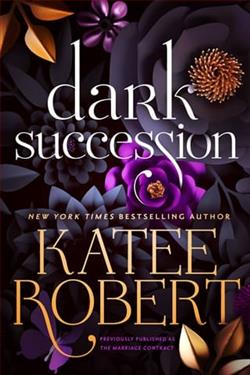Page 501 of Conveniently Wed
A knowing glint flitted through his housekeeper’s gaze and quickly vanished. He wondered what that meant.
“I’m not saying to work the woman to death, but I can find plenty for her to do to feel useful without taxing her too much.” Mrs. Oleson took a sip of her coffee.
He appreciated her idea about helping the Sullivan woman this way. Maybe after a while, she would be able to stand on her own two feet. He couldn’t help hoping that time would come sooner, rather than later. He’d seen the woman’s stubborn streak of pride. She might see through their suggestion and not accept. But that wouldn’t be a bad thing. Would it?
8
Lorinda sat beside the kitchen table, peeling potatoes for the stew Mrs. Oleson was preparing for tonight’s supper. The last two weeks had rushed by while the wonderful woman stirring the pot on the stove helped keep Lorinda’s mind off all her losses. Teaching her to knit, something she had always wanted to do. Helping her sew a few things for herself and for the baby. Giving her tasks that were easy for her to complete.
It had to have been Mrs. Oleson’s idea to offer her a job with room and board as part of her pay. Franklin Vine never would’ve come up with that idea by himself. He kept himself aloof from Lorinda, not saying ten words a day to her. But she didn’t really care, did she? She and her baby would have a home, and with her not needing to spend much of the money he paid her, she could save for their future. Someday, that money, along with the value of the two pokes of gold she had hidden in her room, would give the two of them a start somewhere else. Of course, she didn’t want to settle too far from the property they owned, but maybe she could find a job and a place to stay in Breckenridge, Dillon, or Frisco. Keystone or Silverthorne would be farther than she wanted to go.
Mrs. Oleson turned toward her. “How are you doing with those potatoes?”
“Almost finished.” She picked up the last vegetable. “Only one more.”
The housekeeper wiped her hands on her apron as she came toward the table. “You finished those quickly. I’ll have to set them in water until it’s time to add them to the stew. Potatoes don’t take as long to cook as the carrots do.”
After dropping the peeling, cut in one long curling ribbon, into the bucket for the pigs, Lorinda quickly quartered the potato. “All done.” She stood and reached for the filled crockery bowl on the table.
“Here. Let me get that for you.” Mrs. Oleson set the potatoes on the cabinet and poured water from a large pitcher into the bowl.
“Why do you do that?” Lorinda peeked around the other woman’s shoulder. “Put them in water, I mean.”
“So they’ll stay crisp and don’t turn dark.”
“I never knew that. Mine always had black on them if I didn’t use them right away.”
So much Lorinda hadn’t learned about keeping house and cooking. But Mrs. Oleson was patient, teaching her as they worked together. She wondered what the older woman would do if she were to give her a big hug. Her mother had died a long time ago, and she yearned for a motherly touch.
“I’m glad to see you looking better, dear.” Mrs. Oleson smiled at her. “I worried about you when you first came. You hadn’t been eating as much as you should have. I could tell.”
Lorinda nodded. “Sometimes, it wasn’t worth the effort when I wasn’t feeling so good.” She tried not to dwell on that awful time when she was alone for so long. “Of course, I did have good days when I cooked up a storm. I stored the leftovers in thesnowbank, and they would last for days. But nothing tasted as good as what I’ve had here on the ranch.”
She put her hands on the sides of her waist and stretched her tired back. The baby grew heavier every day. She patted her swollen belly, and the baby tapped the same place from the inside. Such a wonder to get used to.
“Let’s make something special to go with this stew. I brought some dried apples up from the root cellar earlier this morning. They’ve been simmering with raisins while I worked. How would you like an apple and raisin pie?” Mrs. Oleson set a mixing bowl on the table and gave Lorinda a measuring cup. “We need two cups of flour, full to the top.”
After Lorinda followed the directions, the older woman sprinkled a pinch of salt into the flour.
“I love apple pies, but we hardly ever had them. We didn’t get much fruit in the winter.” Lorinda went to the stove and lifted the lid to take a sniff. “Besides, no one ever taught me how to make crust, so I just stirred up some biscuit dough, added sugar, and plopped it on the top of the apples in the pan. I never cooked them ahead of time either. And I never thought about adding raisins. Of course, we didn’t have those very often.”
She hoped Mrs. Oleson didn’t pity her because of her upbringing. At least, the older woman didn’t know the worst of it, and she never would.
“Here’s the best way to make a flaky crust.” While she demonstrated, Lorinda watched everything the woman did, trying to commit it to memory. Besides the flour and salt, Mrs. Oleson added lard, cutting it into the mixture using two table knives, the same way Lorinda did for the biscuits. And she sprinkled in the cold water, a little at a time, while stirring the dough.
“Why didn’t your mother teach you?”
That question caught Lorinda by surprise. She had never told anyone much about her early life, not even Mike. Should she trust this woman with some of the information? Maybe she could let down her walls a little, because Mrs. Oleson had been nothing but kind to her.
“Ma died when I was young. I barely remember her. After that, Pa and me just muddled along the best we could. Most times, we didn’t do a very good job.”
She knew that was vague, but she didn’t want to tell her the whole truth. The shame she carried most of her life. At least, Mike hadn’t probed too deeply, so he loved her instead of pitying her.
“Then you had no way of learning what you needed to know. That’s not your fault.”
Mrs. Oleson’s words poured over her like warm honey, filling the cracks in her defenses. Lorinda nodded.
“You’ve really picked up on the things I’ve been showing you. I imagine you could probably write down a receipt for the pie crust since you were listening so intently.” Mrs. Oleson sprinkled flour over one end of the table, then turned the dough out of the bowl and patted it down until it was about an inch thick. Then she used her well-worn, wooden rolling pin to start flattening it even more. “You don’t want to work the dough too much, or it’ll become tough. Would you like some paper so you can write down the instructions?”















